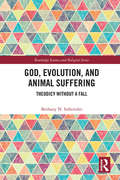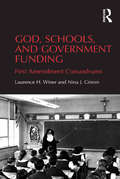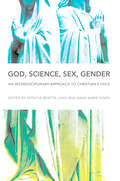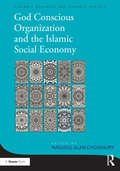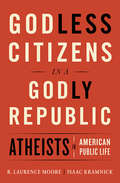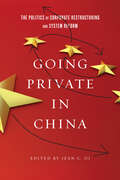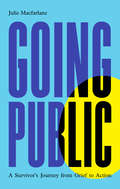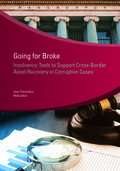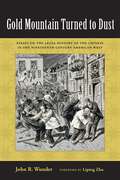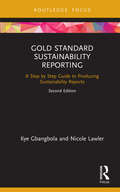- Table View
- List View
God on Trial
by Peter IronsAn insightful and dramatic account of religious conflicts that keep America divided?from the acclaimed author of The Courage of Their Convictions As the United States has become increasingly conservative, both politically and socially, in recent years, the fight between the religious right and those advocating for the separation of church and state has only intensified. As he did in The Courage of Their Convictions, award-winning author and legal expert Peter Irons combines an approachable, journalistic narrative style with intimate first-person accounts from both sides of the conflict. Set against the backdrop of American history, politics, and law, God on Trial relates the stories of six recent cases in communities that have become battlefields in America?s growing religious wars.
God on Trial
by Peter IronsAn insightful and dramatic account of religious conflicts that keep America divided?from the acclaimed author of The Courage of Their Convictions As the United States has become increasingly conservative, both politically and socially, in recent years, the fight between the religious right and those advocating for the separation of church and state has only intensified. As he did in The Courage of Their Convictions, award-winning author and legal expert Peter Irons combines an approachable, journalistic narrative style with intimate first-person accounts from both sides of the conflict. Set against the backdrop of American history, politics, and law, God on Trial relates the stories of six recent cases in communities that have become battlefields in America?s growing religious wars.
God vs. The Gavel
by Marci A. Hamilton Marci A. Hamilton Paul R. Verkuil Benjamin N. Cardozo Paul R. VerkuilGod vs. the Gavel challenges the pervasive assumption that all religious conduct deserves constitutional protection. While religious conduct provides many benefits to society, it is not always benign. The thesis of the book is that anyone who harms another person should be governed by the laws that govern everyone else - and truth be told, religion is capable of great harm.
God, Evolution, and Animal Suffering: Theodicy without a Fall (Routledge Science and Religion Series)
by Bethany N. SollerederAfter the publication of On the Origin of Species in 1859, theologians were faced with the dilemma of God creating through evolution. Suddenly, pain, suffering, untimely death and extinction appeared to be the very tools of creation, and not a result of the sin of humanity. Despite this paradigm shift, the question of non-human suffering has been largely overlooked within theodicy debates, overwhelmed by the extreme human suffering of the twentieth century. This book redresses this imbalance by offering a rigorous academic treatment of the questions surrounding God and the suffering of non-human animals. Combining theological, philosophical, and biblical perspectives, this book explores the relationship between God and Creation within Christian theology. First it dismantles the popular theological view that roots violence and suffering in the animal kingdom in the fall of humanity. Then, through an exploration of the nature of love, it affirms that there are multiple reasons to suggest that God and creation can both be "good", even with the presence of violence and suffering. This is an innovative exploration of an under-examined subject that encompasses issues of theology, science, morality and human-animal interactions. As such, it will be of keen interest to scholars and academics of religion and science, the philosophy of religion, theodicy, and biblical studies.
God, Gender, Sex and Marriage
by Mandy FordAn accessible introduction to important topics that are deeply contested within the Church of England - marriage, gender equality and sexuality. It draws on sources displaying an inclusive perspective whilst staying respectful to those who take a different view.It explores a diverse and fascinating range of questions such as: How should the church treat those who do not conform to gender stereotypes, or experience their gender atypically? Are there limits to inclusion? What should the church say about desire and self-control?Informative and thought-provoking, this book enables the reader to 'think better' about the issues discussed by presenting the history, the religious texts, the forms of reasoning and the recent scholarship which these topics have attracted both inside and outside of theology.
God, Schools, and Government Funding: First Amendment Conundrums
by Laurence H. Winer Nina J. CrimmIn recent years, a conservative majority of the U.S. Supreme Court, over vigorous dissents, has developed circumventions to the Establishment Clause of the First Amendment that allow state legislatures unabashedly to use public tax dollars increasingly to aid private elementary and secondary education. This expansive and innovative legislation provides considerable governmental funds to support parochial schools and other religiously-affiliated education providers. That political response to the perceived declining quality of traditional public schools and the vigorous school choice movement for alternative educational opportunities provokes passionate constitutional controversy. Yet, the Court’s recent decision in Arizona Christian School Tuition Organization v. Winn inappropriately denies taxpayers recourse to challenge these proliferating tax funding schemes in federal courts. Professors Winer and Crimm clearly elucidate the complex and controversial policy, legal, and constitutional issues involved in using tax expenditures - mechanisms such as exclusions, deductions, and credits that economically function as government subsidies - to finance private, religious schooling. The authors argue that legislatures must take great care in structuring such programs and set forth various proposals to ameliorate the highly troubling dissention and divisiveness generated by state aid for religious education.
God, Science, Sex, Gender: An Interdisciplinary Approach to Christian Ethics
by Joan Roughgarden Patricia Beattie Jung John Anderson John McCarthy Aana Marie Vigen Pamela L. Caughie Terry Grande Joel S. Brown James Calcagno Francis J Catania Robin Colburn Robert De Vito Susan A Ross Frank Fennell Anne E Figert Fred Kniss Jon Nilson Stephen J PopeGod, Sex, Science, Gender: An Interdisciplinary Approach to Christian Ethics is a timely, wide-ranging attempt to rescue dialogues on human sexuality, sexual diversity, and gender from insular exchanges based primarily on biblical scholarship and denominational ideology. Too often, dialogues on sexuality and gender devolve into the repetition of party lines and defensive postures, without considering the interdisciplinary body of scholarly research on this complex subject. This volume expands beyond the usual parameters, opening the discussion to scholars in the humanities, social sciences, and natural sciences to foster the development of Christian sexual ethics for contemporary times. Essays by prominent and emerging scholars in the fields of anthropology, sociology, psychology, philosophy, literary studies, theology, and ethics reveal how faith and reason can illuminate our understanding of human sexual and gender diversity. Focusing on the intersection of theology and science and incorporating feminist theory, God, Science, Sex, Gender is a much-needed call for Christian ethicists to map the origins and full range of human sexual experience and gender identity. Essays delve into why human sexuality and gender can be so controversial in Christian contexts, investigate the complexity of sexuality in humans and other species, and reveal the implications of diversity for Christian moral theology. Contributors are Joel Brown, James Calcagno, Francis J. Catania, Pamela L. Caughie, Robin Colburn, Robert Di Vito, Terry Grande, Frank Fennell, Anne E. Figert, Patricia Beattie Jung, Fred Kniss, John McCarthy, Jon Nilson, Stephen J. Pope, Susan A. Ross, Joan Roughgarden, and Aana Marie Vigen.
God, the Good, and Utilitarianism
by John PerryIs ethics about happiness? Aristotle thought so and for centuries Christians agreed, until utilitarianism raised worries about where this would lead. In this volume, Peter Singer, leading utilitarian philosopher and controversial defender of infanticide and euthanasia, addresses this question in conversation with Christian ethicists and secular utilitarians. Their engagement reveals surprising points of agreement and difference on questions of moral theory, the history of ethics, and current issues such as climate change, abortion, poverty and animal rights. The volume explores the advantages and pitfalls of basing morality on happiness; if ethics is teleological, is its proper aim the subjective satisfaction of preferences? Or is human flourishing found in objective goods: friendship, intellectual curiosity, meaningful labour? This volume provides a timely review of how utilitarians and Christians conceive of the good, and will be of great interest to those studying religious ethics, philosophy of religion and applied ethics.
God-Conscious Organization and the Islamic Social Economy (Islamic Business and Finance Series)
by Masudul Alam ChoudhuryCan there be God-conscious organizational behaviour in the real world of today’s capitalist corporations and the alternatives? In this overview of God-consciousness as a moral-awareness model of preference formation, functions, structures, and programs of organization within the purview of institutions and society, the authors explain and compare the major ethical issues of organizational behaviour and structure in Islamic economic theory and application. By analysing the nature of inclusive organizations and institutions, and the ethical preferences in Islamic choice framework, the authors from Saudi Arabia, Australia, Malaysia, Bangladesh, Canada, Indonesia and the UK, can highlight individual aspects to show whether capitalist organizational behaviour is sustainable. They describe how The Tawhidi epistemological framework governing conscious moral decision-making by institutions and organization, are used to establish the meaning and potential application of the concept of sustainability, and whether organizational moral objectives achieve their goals of life-fulfilment development, Poverty alleviation and the equitable distribution of wealth and resources.
Godless Citizens in a Godly Republic: Atheists In American Public Life
by R. Laurence Moore Isaac KramnickIf the First Amendment to the U.S. Constitution protects religious liberty, why doesn’t it protect atheists? God occupies our nation’s consciousness, even defining to many what it means to be American. Nonbelievers have often had second-class legal status and have had to fight for their rights as citizens. As R. Laurence Moore and Isaac Kramnick demonstrate in their sharp and convincing work, avowed atheists were derided since the founding of the nation. Even Thomas Paine fell into disfavor and his role as a patriot forgotten. Popular Republican Robert Ingersoll could not be elected in the nineteenth century due to his atheism, and the suffragette Elizabeth Cady Stanton was shunned when she questioned biblical precepts about women’s roles. Moore and Kramnick lay out this fascinating history and the legal cases that have questioned religious supremacy. It took until 1961 for the Supreme Court to ban religious tests for state officials, despite Article 6 of the Constitution. Still, every one of the fifty states continues to have God in its constitution. The authors discuss these cases and more current ones, such as Burwell v. Hobby Lobby Stores, Inc., which address whether personal religious beliefs supersede secular ones. In Godless Citizens in a Godly Republic, the authors also explore the dramatic rise of an "atheist awakening" and the role of organizations intent on holding the country to the secular principles it was founded upon.
Gods in Shackles: What Elephants Can Teach Us About Empathy, Resilience, and Freedom
by Sangita IyerWith a foreword by Jane Goodall, this moving memoir follows a successful journalist and filmmaker who felt like something was missing in her life as she finds her purpose in advocacy for the Asian elephants in her childhood home town of Kerala, India."The greatness of a nation and its moral progress can be judged by the way its animals are treated." - Mahatma GandhiElephants are self-aware, conscious beings. They can feel and grieve the loss of both elephants and humans. But despite all empathy that elephants shower on humans, we continue to inflict pain and suffering on these caring, sentient beings.In 2013 Sangita Iyer visited her childhood home of Kerala, India. Over 700 Asian elephants live in Kerala, owned by individuals and temples that force them to perform in lengthy, crowded, noisy festivals, abusing and shackling these animals they claim to revere for tourists and money.When Sangita found herself in the presence of these divine creatures and witnessed their suffering first hand, she felt a deep connection to their pain. She too had been shackled and broken for too long-to her patriarchal upbringing in India, to the many "me too" moments in her work life that were swept under the rug, to the silence. Now she would speak out for the elephants and for herself. And she would heal alongside them.This sparked the creation of her award winning documentary of the same name and a new purpose in this life for both Sangita and the elephants.
Going Around: Selected Journalism
by Murray KemptonA definitive collection of writings by the legendary Pulitzer Prize-winning reporter Murray Kempton (1917-1997) with a foreword by Darryl Pinckney, gathering dozens of columns, essays, and critiques from publications including The New York Post, The New York Review of Books, The New Republic, and Newsday.With many uncollected and long out-of-print writings, this is the first volume of Kempton&’s work to appear in 30 years, a book that resdiscovers the legendary figure of journalism that David Remnick called &“the greatest newspaperman in town.&”&“The man is a marvel. It&’s like listening to Louis Armstrong, or Roy Eldridge: you don&’t know where the hell he is going, but somehow he gets there and it knocks your socks off.&” —Frank SinatraA courtly man of Southern roots, Murray Kempton worked as a labor reporter for the New York Post, won a Pulitzer Prize while at Newsday, and was arrested at the Democratic National Convention in Chicago along the way. He wore three piece suits and polished oxfords and was known for riding his bicycle around New York City while listening to his CD Walkman and smoking a pipe with wild red hair that later turned white. He developed a taste for baroque prose and became, in the words of Robert Silvers, his editor at The New York Review of Books, ''unmatched in his moral insight into the hypocrisies of politics and their consequences for the poor and powerless.''He went to court proceedings and traffic accidents and funerals and to speeches by people who either were or wanted to be rich and famous. He wrote about everything and anybody—Tonya Harding and Warren Harding, Fidel Castro and Mussolini, Harry Truman and Sal Maglie, St. Francis of Assisi and James Joyce and J. Edgar Hoover.From dispatches from a hardscrabble coal town in Western Maryland, a bus carrying Freedom Riders through Mississippi, an Iowa cornfield with Nikita Krushchev, an encampment of guerrillas in El Salvador, and Moscow at the end of the Soviet Union (these last two assignments filed by a reporter in his 70s), Kempton&’s concerns and interests were extraordinarily broad. He wrote about subjects from H.L. Mencken to Tupac Shakur; organized labor and McCarthyism; the Civil Rights and Black Power movements; presidential hopefuls and Mafiosi; frauds and failures of all stripes; the &“splendors and miseries&” of life in New York City.
Going Free: American POWs in WWII Philippines (A Vintage Short)
by Hampton SidesAn eBook short.From Hampton Sides's Ghost Soldiers, a gripping narrative of World War II POWs on the brink of freedom. The men of Cabanatuan had been held by the Japanese since the Bataan Death March, in increasingly dire circumstances. With the war turning in the Americans' favor, the POWs worried that their captors would murder them all in the frenzy of an all-out withdrawal. Then one day in early January, 1945, the prison guards simply left. For a brief moment the haggard survivors of Cabanatuan were given the keys to their prison, though swift death was promised to anyone who dared leave. The prisoners waited nervously, all while (unbeknownst to them) a daring raid was being planned which would result in their rescue or their end. This is Hampton Sides at his most riveting, a fitting tribute to these soldiers who would be prisoners no more.
Going Infinite: The Rise And Fall Of A New Tycoon
by Michael LewisAN INSTANT #1 NEW YORK TIMES BESTSELLER One of the New Yorker's Best Books of 2023 • One of Pure Wow's 42 Book to Gift This Year • One of Fortune's Best Crypto Books of 2023 "Going Infinite is in many ways Lewis at his best. He marshals a complex global story without losing sight of the delightful and revealing human details. He is a world-class noticer."—Jesse Armstrong, writer and creator of HBO’s Succession, Times Literary Supplement "A stupefyingly pleasurable book to read." —Gideon Lewis-Kraus, The New Yorker "Going Infinite is an instant classic." — Helen Lewis, The Atlantic "Going Infinite is wildly entertaining, surprising multiple times on pretty much every page, but it adds up to a sad story, even a tragedy, for its central character and for all the people who lost so much thanks to his actions." —John Lanchester, London Review of Books "Will join Digital Gold as one of the all-time best crypto books."—Jeff John Roberts, Fortune "A wry, engaging writer and a gifted storyteller." —Julia M. Klein, Los Angeles Times "It may be easy to take for granted how entertainingly [Michael Lewis] pulls it off again in Going Infinite." —Brett Martin, GQ From the best-selling author of The Big Short and Flash Boys, the story of FTX’s spectacular collapse and the enigmatic founder at its center. When Michael Lewis first met him, Sam Bankman-Fried was the world’s youngest billionaire and crypto’s Gatsby. CEOs, celebrities, and leaders of small countries all vied for his time and cash after he catapulted, practically overnight, onto the Forbes billionaire list. Who was this rumpled guy in cargo shorts and limp white socks, whose eyes twitched across Zoom meetings as he played video games on the side? In Going Infinite Lewis sets out to answer this question, taking readers into the mind of Bankman-Fried, whose rise and fall offers an education in high-frequency trading, cryptocurrencies, philanthropy, bankruptcy, and the justice system. Both psychological portrait and financial roller-coaster ride, Going Infinite is Michael Lewis at the top of his game, tracing the mind-bending trajectory of a character who never liked the rules and was allowed to live by his own—until it all came undone.
Going Private in China: The Politics of Corporate Restructuring and System Reform
by Jean C. OiAs the Chinese Communist Party (CCP) set about reforming its centrally planned economy, it faced the thorny policy question of how to reform its state-owned enterprises (SOEs). Should it support a shift from public to private ownership of the means of production? Such a shift would challenge not only the CCP's socialist ideology but also its very legitimacy. Mixing the business of corporate restructuring with the politics of socialism presented nothing short of a policy nightmare. With policy-relevant acuity, the contributors to this wide-ranging volume address the questions about reform programs that have plagued China—and East Asia more broadly—since the 1990s. While China, Japan, and South Korea have all been criticized for implementing reform too slowly or too selectively, this volume delves into the broader contexts underlying certain institutional decisions. The book seeks to show that seemingly different political economies actually share surprising similarities, and problems. While Going Private in China sheds new light on China's corporate restructuring, it also offers new perspectives on how we think about the process of institutional change.
Going Public: A Survivor's Journey From Grief To Action
by Julie MacfarlaneGoing Public merges the worlds of personal and professional, activism and scholarship. Drawing upon decades of legal training, Macfarlane decodes the well-worn methods used by church, school, and state to silence survivors, from first reporting to cross-examination to non-disclosure agreements. At the same time, she lays bare the isolation and exhaustion of going public in her own life, as she takes her abuser to court, challenges her colleagues, and weathers a defamation lawsuit.
Going Under: Kidnapping, Murder, and a Life Undercover
by John Madinger&“I just want to make sure I&’ve got this right. You hanged all three of them? ...&” That&’s how it began, a case where the cops are crooks and the crooks are cops, a kidnapping where the victim is the bad guy, and the good guys must cross some lines to get him back. Welcome to the upside down and backward world of the undercover agent, where nothing is as it seems, and people – including the undercover – may not be what they appear.?GOING UNDER: Kidnapping, Murder, and A Life Undercover by former undercover agent John Madinger takes you into that world, and closer to the truth of the undercover experience than any other law enforcement memoir has ever gone. ""What is it like to work undercover?"" You&’re a sheepdog in wolf&’s clothing, running with the pack, and Madinger ran with the wolves for almost two decades. Now he shares his story to give you a unique look at American crime and the ""War on Drugs"" from the perspective of both cops and criminals. You&’ll go with the undercover cops to meetings with street-corner hustlers and rip-off artists and into the lives of the America&’s biggest rock stars, the world&’s richest man, an Academy Award-winning actor, the marijuana traffickers conspiring to assassinate a federal judge, and the President of the United States. It&’s an amazing ride, and there has never been another story like it.
Going Up the River: Travels in a Prison Nation
by Joseph T. HallinanThe American prison system has grown tenfold in thirty years, while crime rates have been relatively flat: 2 million people are behind bars on any given day, more prisoners than in any other country in the world -- half a million more than in Communist China, and the largest prison expansion the world has ever known. In Going Up The River, Joseph Hallinan gets to the heart of America's biggest growth industry, a self-perpetuating prison-industrial complex that has become entrenched without public awareness, much less voter consent. He answers, in an extraordinary way, the essential question: What, in human terms, is the price we pay? He has looked for answers to that question in every corner of the "prison nation," a world far off the media grid -- the America of struggling towns and cities left behind by the information age and desperate for jobs and money. Hallinan shows why the more prisons we build, the more prisoners we create, placating everyone at the expense of the voiceless prisoners, who together make up one of the largest migrations in our nation's history.
Going for Broke: Insolvency Tools to Support Cross-Border Asset Recovery in Corruption Cases (StAR Initiative)
by Jean-Pierre Brun Molly SilverGoing for Broke focuses on insolvency as an additional civil remedy in the arsenal of asset recovery practitioners, specifically in the context of grand corruption investigations and proceedings. The recovery of corruption proceeds is often sought through criminal prosecution and confiscation or civil lawsuits. Insolvency proceedings can also be an effective mechanism in the right circumstances, with their own advantages and disadvantages. The scenario that is most likely to benefit from this type of remedy is one in which bribes and stolen funds have been routed through special-purpose companies. This guidebook is intended as a practical tool to help policy makers, public officials, and those who have been entrusted with recovering their nations' stolen assets. It informs them about the ways that insolvency can be used to pursue proceeds of corruption. It may also serve as a quick reference for other practitioners: insolvency professionals, auditors, financial institutions, in-house counsel, and other professionals who deal with corruption.
Going the Distance: Eurasian Trade and the Rise of the Business Corporation, 1400-1700 (The Princeton Economic History of the Western World #88)
by Ron HarrisBefore the seventeenth century, trade across Eurasia was mostly conducted in short segments along the Silk Route and Indian Ocean. Business was organized in family firms, merchant networks, and state-owned enterprises, and dominated by Chinese, Indian, and Arabic traders. However, around 1600 the first two joint-stock corporations, the English and Dutch East India Companies, were established. Going the Distance tells the story of overland and maritime trade without Europeans, of European Cape Route trade without corporations, and of how new, large-scale, and impersonal organizations arose in Europe to control long-distance trade for more than three centuries.Ron Harris shows that by 1700, the scene and methods for global trade had dramatically changed: Dutch and English merchants shepherded goods directly from China and India to northwestern Europe. To understand this transformation, Harris compares the organizational forms used in four major regions: China, India, the Middle East, and Western Europe. The English and Dutch were the last to leap into Eurasian trade, and they innovated in order to compete. They raised capital from passive investors through impersonal stock markets and their joint-stock corporations deployed more capital, ships, and agents to deliver goods from their origins to consumers.Going the Distance explores the history behind a cornerstone of the modern economy, and how this organizational revolution contributed to the formation of global trade and the creation of the business corporation as a key factor in Europe’s economic rise.
Going to Hell to Get the Devil: The 1972 Charlotte Three Case and the Freedom Struggle in a Sunbelt City (Making the Modern South)
by J. Christopher SchutzThe 1968 burning of the Lazy B Stables in Charlotte, North Carolina, attracted little notice beyond coverage in local media. By the mid-1970s, however, the fire had become the center of a contentious and dubious arson case against a trio of Black civil rights activists, who became known as the “Charlotte Three.” The charges against the men garnered interest from federal law enforcement agents, investigative journalists— including one who later earned a Pulitzer Prize for coverage of the trials—numerous New Left and Black Power activists, and Amnesty International, which declared the defendants “political prisoners.” In Going to Hell to Get the Devil, J. Christopher Schutz offers the first comprehensive examination of this controversial case and its outcome. In the 1960s and 1970s, Charlotte’s leaders sought to portray their home as a placid, business-friendly, and racially moderate community. When New Left and Black Power activists threatened that stability, city leaders employed a variety of means to silence them, including the use of law enforcement against African Americans they deemed too zealous. In the Charlotte Three case, prosecutors paid prisoners for testimony against the Black activists on trial, resulting in their convictions with lengthy prison sentences. The unwanted publicity surrounding the case of the Charlotte Three became a critical pivot point in the Queen City’s post–World War II trajectory. Going to Hell to Get the Devil tells more than the story of an arson case; it also tells the story of the South’s future, as the fate of the Charlotte Three became emblematic of the decline of the African American freedom struggle and the causes it championed.
Gold Bar Bob: The Downfall of the Most Corrupt US Senator
by Isabel Vincent Thomas Jason Anderson"American politics at its sleaziest."—Publishers Weekly Power corrupts, and in the case of New Jersey Senator Robert Menendez, power—and boatloads of money—corrupted absolutely and led to the downfall of the Democratic Party.Senator Bob Menendez stands alone as the most corrupt US Senator in history. After corruption charges were dropped in a 2017 mistrial, he may have considered himself invincible. But when the Feds raided his home in June 2022, they found a gifted Mercedes Benz, more than $600,000 in cash, and thirteen gold bars stuffed in envelopes, clothes, and closets. It was an outrageous haul for a man who styled himself as a fierce anti-corruption crusader, an ambitious Democrat who overthrew his mob-connected predecessor and rose through the ranks to the House of Representatives and the Senate to serve as the Chairman of the Senate Foreign Relations Committee. From New York Post writer Isabel Vincent and government watchdog Thomas Jason Anderson comes the unbelievable story of a vast web of lies and a stunning conviction. Gold Bar Bob chronicles Menendez&’s politicking for profit as he enriched a network that included the New Jersey mafia and businessmen from the Caribbean, Latin America, and the Middle East. In exchange for personal and campaign contributions, Bob aided others to sway criminal prosecutions, defraud millions from Medicare, secure questionable visas, acquire government contracts and financial investments, obtain millions in firearms, and weaken Homeland Security. While Menendez was convicted of sixteen felony counts—including bribery, extortion, fraud, acting as a foreign agent, obstruction of justice, and several counts of conspiracy—there are still many secrets to unveil. After nearly a half-century political career, the lies will finally be unraveled about his family&’s origins, how his second wife may be part of his crimes, and how much he attempted to get away with.
Gold Coast (John Sutter)
by Nelson DeMilleThe upmarket and salubrious area of Long Island is the stamping ground for a dying breed of America's super-rich. It is also the residence of John Sutter, lawyer - very top-drawer, old money, right clubs - and his sensual wife, Susan. Their lives are about to be turned dramatically upside down by their new 'next-door' neighbour - a certain Mr Frank Bellarosa, top Mafia don and master manipulator. It is he who will impress upon them a rule much older than the archaic etiquette of the old-money set: a favour accepted is a favour owed.Twenty-five years after it was first published, Nelson DeMille's Gold Coast stands as a modern thriller classic, a stylish, compelling and provocative novel will grip readers from beginning to end.
Gold Mountain Turned to Dust: Essays on the Legal History of the Chinese in the Nineteenth-Century American West
by John R. WunderSome half million Chinese immigrants settled in the American West in the nineteenth century. In spite of their vital contributions to the economy in gold mining, railroad construction, the founding of small businesses, and land reclamation, the Chinese were targets of systematic political discrimination and widespread violence. This legal history of the Chinese experience in the American West, based on the author&’s lifetime of research in legal sources all over the West—from California to Montana to New Mexico—serves as a basic account of the legal treatment of Chinese immigrants in the West.The first two essays deal with anti-Chinese racial violence and judicial discrimination. The remainder of the book examines legal precedents and judicial doctrines derived from Chinese cases in specific western states. The Chinese, Wunder shows, used the American legal system to protect their rights and test a variety of legal doctrines, making vital contributions to the legal history of the American West.
Gold Standard Sustainability Reporting: A Step by Step Guide to Producing Sustainability Reports
by Kye Gbangbola Nicole LawlerThis highly practical and concise book shows you how to undertake a reporting process and produce a sustainability report in line with the new standards and frameworks presented by the International Integrated Reporting Council (IIRC) and the Global Reporting Initiative (GRI). Fully updated to ensure compliance with the new standards, this second edition shows how to actually produce a sustainability report as well as the key processes in the planning: how to produce a business case; the development of actions plans; process and team leadership; and generating cross-functional buy-in. Templates are provided for certain steps in order to simplify the tasks involved at each point in the process. Anyone involved in delivering or developing a process to embed sustainability reporting for an organisation will find this book invaluable, for example, chief sustainability officers, chief financial officers and company secretaries. It will also be of interest to students in the field of sustainability.


